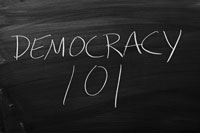



Constitution Day at Fredonia will be observed with a series of events, including a guest speaker who will address whether President Donald Trump’s actions are permitted under the Constitution; open dialogues for students and faculty to discuss what the Constitution means to them, and an exercise in “handwriting” the Constitution, all during the third week of September.
 |
 |
Anna O. Law, the Herbert Kurz Chair of Constitutional Rights and an associate professor of political science at CUNY Brooklyn College, will present “Are Trump’s Actions Constitutional? Immigration, Judicial Independence and Democratic Institutions” on Monday, Sept. 18, at 3 p.m., in Williams Center Room S204-ABC.
Dr. Law’s first book, “The Immigration Battle in American Courts,” examined the role of the federal judiciary in U.S. immigration policy and the institutional evolution of the Supreme Court and the U.S. Court of Appeals. She has written articles for both social science and law journals that investigate the interaction between law, legal institutions and politics.
Law is a former program analyst at the bipartisan, blue-ribbon United States Commission on Immigration Reform. She has shared her expertise with the U.S. Senate Judiciary Committee, Department of Homeland Security and National Science Foundation. In 2007, she appeared as a recurring narrator with other academic experts and two Supreme Court justices in a PBS award winning documentary.
The act of handwriting the Constitution originated with Morgan O’Hara, an artist, who brought paper and Sharpies to the New York Public Library’s main reading room and began copying the document. The idea behind the exercise, which had been done in grammar schools, is to experience the words more closely to enhance comprehension and understanding .Reading the text is essential to understanding the Constitution, but scholars note it is only a first step. A variety of interpretative techniques, or modalities, have been employed by judges, justices and scholars of the Constitution.
In “Handwriting the Constitution,” Fredonia students enrolled in two courses, American Constitutional Law and Civil Rights and Liberties, will produce posters explaining and illustrating each of the modalities of interpretation. Their posters, which will show how modalities have been used in the past and why they are crucial to understanding the Constitution today, will be put on display, Sunday through Wednesday, Sept. 17 to 20, in the Reed Library Common Space.
Supplies and space will be provided in the library’s Common Space on Sunday, Sept. 17 (Constitution Day) and Monday, Sept. 18, to create copies of the Constitution. These may be put on display.
Opportunities for students, faculty and community members to participate, explore and exchange views related to the topic “What does the Constitution Mean to Me” will be conducted on three consecutive days in the library’s common space. The first session, Monday, Sept. 18, noon to 12:50 p.m., will be moderated by Dr. David Kaplin of the Department of English; the second, Tuesday, Sept. 19, 5 to 6 p.m., will be moderated by Drs. Junaid Zubairi of the Department of Computer and Information Sciences, Bruce Simon of the Department of English and Jonathan Chausovsky of the Department of Politics and International Affairs; the third, on Wednesday, Sept. 20, 4 to 5 p.m., will be led by Dr. Ellen Litwicki of the Department of History. The sessions will also be in the Reed Library Common Space.
All Constitution Day events are free and open to the public.
Complementing Fredonia’s Constitution Day events will be the upcoming talk, “Calling a Constitutional Convention in New York: The Process and the Issues,” to be given by Canisius College Professor Emeritus Peter Galie on Tuesday, Oct. 3, 3:30 to 4:50 p.m., in the library garden area.
Dr. Galie is the co-editor of “New York’s Broken Constitution: The Governance Crisis and the Path to Renewed Greatness,” as well as the author or co-editor of three books and numerous articles that examine state constitutional law. He was retained by the Attorney General of New York to present a report to accompany the Attorney General’s appeal in Hayden v. Pataki, “The Felony Disenfranchisement Clause of the New York Constitution 1821-1938: Background, Chronology, Origin and Purpose.” Galie is currently a member of a task force on the Judiciary Article of the State Constitution formed by Chief Judge of the Court of Appeals Janet DiFiore.
Galie’s talk, part of Fredonia’s Democracy 101 Series, is free and open to the public.